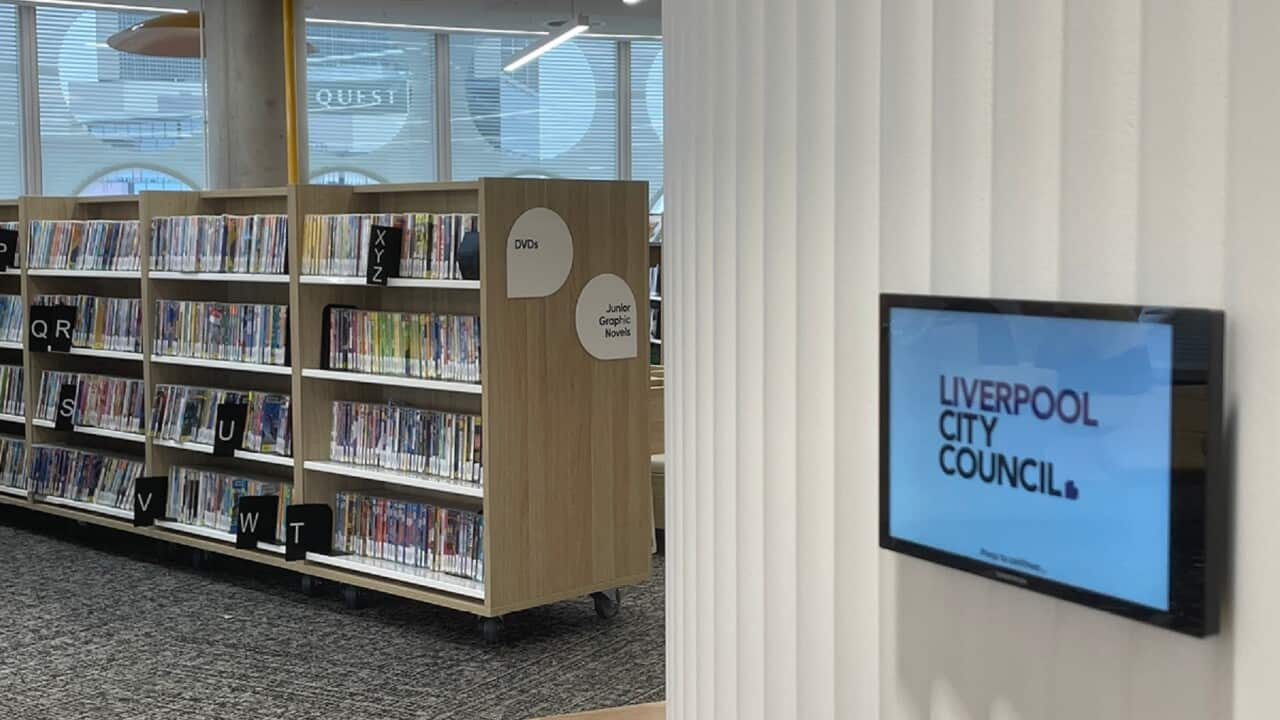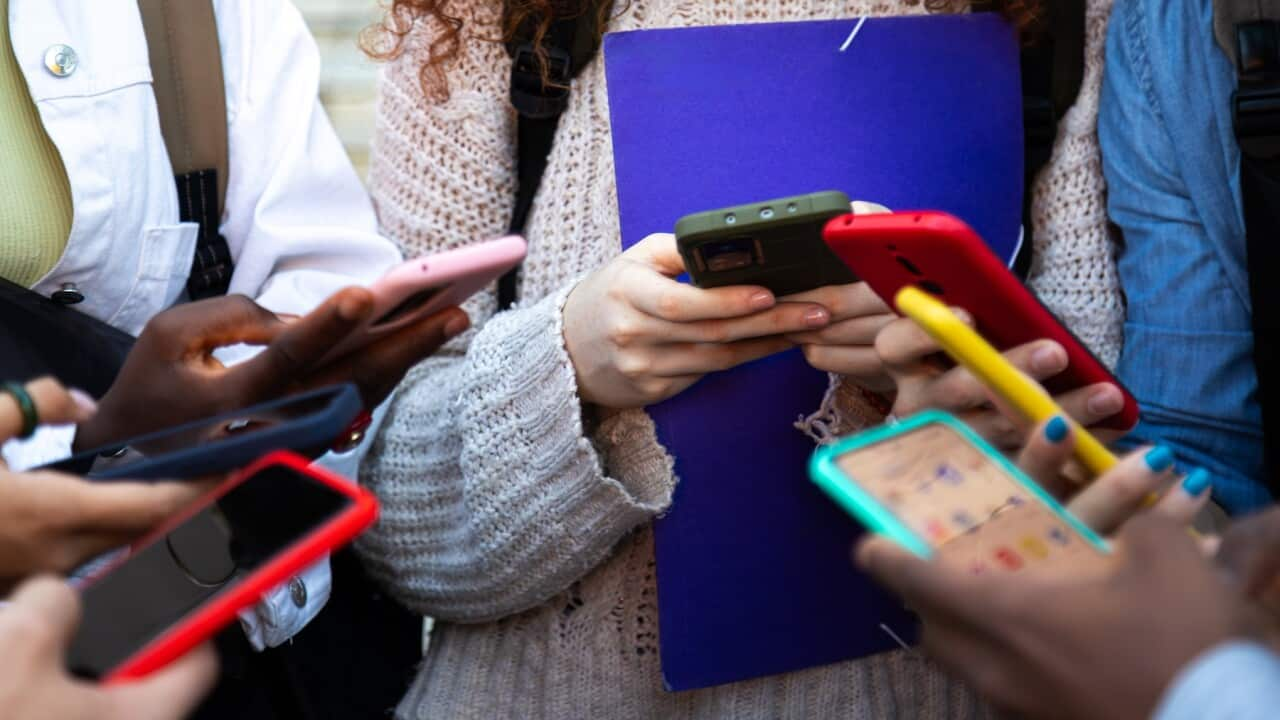TRANSCRIPT
"The only thing that you absolutely have to know, is the location of the library."
"When in doubt go to the library."
"Libraries always remind me that there are good things in this world."
"Librarians are tour-guides for all of knowledge."
"In the nonstop tsunami of global information, librarians provide us with floaties and teach us to swim."
Quotes from some of the world's most famous thinkers and writers including Albert Einstein and J.K Rowling. professing their love of libraries.
Elysa Dennis is the manager of Library and Museum services for Liverpool Council in Sydney.
She loves libraries so much, she's made a career out of them - now at the Yellamundie [[yeah-luh-mun-dee]] Library in multicultural Liverpool in south-western Sydney.
"Libraries are bigger and more popular than ever. I think about a library as the most democratic space a council can build for its community. Everybody is welcome in a library. You don't need a particular reason to be coming to the library. There's something to do or to see or to have or to connect or to learn in a library for just about every member of the community. "
Yellamundie means story teller in the local Dharug language.
It's a multi-storey circular building with work stations, a children's section, a public gallery and more than two kilometres of books among other items on its shelves.
It opened in 2023, and it's easy to see why the library was one of four short listed in a competition by The International Federation of Library Associations [[I-F-L-A]].
Elysa Dennis says libraries go beyond just being source of knowledge - at their core they're about people.
"If you're here at three o'clock, you will not find a spare seat. The kids are everywhere, which is absolutely the way we want it. And they have a really strong sense of ownership with this building. A lot of the feedback we get, particularly from the kids, is we can't believe we got something like this in Liverpool. They are so proud. And from a librarian's point of view, to be looking after a building that does exactly what a library is supposed to do, it's supposed to lift people up, it's supposed to give people opportunities. It's supposed to allow them spaces to connect and to form new friendships and to aspire. It's all about education, connection and heart for a community."
While Yellumundie didn't take out the top prize this year- that went to the 75,000 square metre Beijing Library, making the shortlist was a huge achievement.
The Beijing Library co-designed by Norwegian and Chinese architects, overlooks the nearby Tonghui River, replicating its curves in its design.
Even in photographs, it's easy to see why the international panel of judges described the building as spectacular.
Yellumundie is a little more modest in scale.
On the days SBS visits, a group of parents and their children are enjoying a play session, including this man - who recently migrated from Saudi Arabia.
He visits libraries with his partner and young child, because he says - some experiences cannot be replicated online.
"Some people prefer to read books and have their own library on the internet...soft books, but actually most of the people, I think they prefer to touch the books and to read by themselves. It's much more motivating than reading on the internet online. So I think existence of the library is still much more important than we think."
So when did libraries first emerge?
Trish Hepworth, Acting CEO of the Australian Library and Information Association, says there's no clear answer.
"Look, it's an interesting question in so many ways, which is exactly the non-committal answer you'd expect when you ask a question like that. We've had libraries in the sort of western comprehension of libraries for an awfully long time"
What is known is that libraries date back thousands of years.
The Great Library of Alexandria in Egypt was the most famous library in the ancient world, flourishing for centuries before falling into ruin.
Experts say public libraries in the west really took off in the mid 19th century with increasing industrialisation and higher literacy rates partly a factor.
Trish Hepworth again.
"Throughout sort of that western history, we've had examples of various sorts of libraries from the libraries in the monastic tradition through medieval Europe, to some of the great private libraries of the Gentry through to the giant growth in mechanics institutes and other more private libraries in places like the UK and Australia, and the great movement which really took off in the 1900s in Australia towards the provision of public libraries for everybody."
Beyond physical buildings, libraries can take multiple forms.
Cultures with strong oral traditions for example may have different ways of managing knowledge that doesn't necessarily fit into a book or a building.
At their most basic level, libraries are about transmitting and communicating knowledge.
And that's what Anastasia is doing, reading to her 18 month old daughter perched on her lap.
"So she's reading spot at Christmas. What is Spot doing today? Spot's room, book."
Peggy: "And do you think libraries still matter for people in the age of the Internet?"
"Oh yeah, a hundred percent. And I've just seen that through my daughter with me reading to her and her reading books. She's developed language and she prefers it. She prefers it more than looking at cartoons on the TV. Yeah. I think growing up I inherited a lot of that in regards to me bringing up my daughter as well. So my mum brought me to the library and now I'm bringing my daughter to the same library. So it's very nice and beautiful. Yeah."
The COVID pandemic saw more people than ever before access digital library content.
Trish Hepworth says physical visitation levels have returned to what they were pre-pandemic with digital offerings continuing to grow.
"Obviously more people during Covid where they couldn't actually get to the library turned to eBooks and audiobooks so that they could keep that. We are still seeing a higher level of use of digital content, but we are also seeing people coming back to that physical space. I think that's one of the challenges for especially the public libraries at the moment is limited resources. How do you manage to continue to provide both that fantastic physical space that's obviously so valued and also that continued growth in digital and eContent."
Elysa Dennis says while digital loans are booming at Yellumundie - when it comes to one of life's essentials, teaching children to read, old methods are still the way to go.
"Look, the physical book is still king for us. we are at about the hundred thousand for digital loans. And that number is increasing. It is doubling. It's doubling. It is really ramping up. It's a different user experience. The convenience of digital is fabulous, but digital, there are some things that digital doesn't do as well as physical, particularly when you're talking about teaching children to read. The physicality of turning a page, it helps cement that learning and that literacy process. So particularly in the children's space, the picture book is always going to have a spot."
And in an era when loneliness is affecting more and more people, having somewhere to go that's free can be an important circuit breaker.
"Sometimes it's just having a connection with someone. It's someone said, good morning to me today. And for someone that's living on their own, that might be the most important interaction they have in that day. It might be a conversation they have with someone else that they're sharing a newspaper. We have a group of elderly gentlemen that come in and read their home language newspapers every morning. And that's their morning routine . They come in, they read the newspapers on their own, and then they have a chat about it and then they go off to their own own homes. Where else do you do that? So yeah, more and more people are coming to libraries. They're actually getting bigger. They're not getting smaller."
The Australian public libraries statistical report released in 2023, showed there were just over 55 million [[55,496,787]] physical visits to Australian libraries between 2021-2022.
The number of library website visits reached just over 50.3 million according to the same report.
The report says the physical visit numbers reported were down due to the COVID pandemic.













